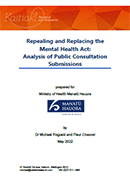
We sought views on what new mental health legislation should look like in Aotearoa New Zealand.
The Government has agreed to repeal and replace the Mental Health (Compulsory Assessment and Treatment) Act 1992 (the Mental Health Act). To begin a dialogue on what new mental health legislation should like in Aotearoa New Zealand, we released a public consultation discussion document Transforming Our Mental Health Law: A Public Discussion Document.
This document covered areas that must be addressed in any new mental health legislation:
- Embedding Te Tiriti and addressing Māori cultural needs
- Defining the purpose of mental health legislation, including considering a human rights approach and whether compulsory mental health treatment should ever be allowed
- Defining why, when, and how compulsory mental health treatment, if permitted, might be appropriate
- Ensuring people are able to use appropriate tools to support them to make decisions about their care and treatment
- Considering the use, or prohibition, of seclusion, restraint, or other restrictive practices
- Addressing the needs of specific populations: people from different cultures, family and whānau, children and youth, disabled people, and people from the justice system
- Ensuring people’s rights are protected and monitored.
Public consultation opened on 22 October 2021 and closed on 28 January 2022. The Ministry of Health engaged widely to ensure feedback was representative of key groups, including people with lived experience and their family and whānau, Māori, Pacific, Asian and ethnic communities, the mental health sector including non-government organisations, clinicians, as well as the general public.
Summary of submissions
There were two ways people could provide feedback, either via a written submission or by attending online consultation hui. We received 317 written submissions and feedback from over 500 people who attended over 60 online consultation hui. The full submissions analysis document contains the analysis of this feedback.
There are also four appendices which provide detailed analysis of views from the four targeted population groups who participated in the online consultation hui.
- People with lived experience and their family and whānau
- Māori, Pacific, Asian and ethnic communities
- the mental health sector, including non-government organisations (NGOs) and clinicians
- the general public.
General themes from the submissions
Please take care: It may be tough reading some of these submissions, particularly if they remind you of difficult past experiences. You may need to check in with your support person/network but if you need additional support, you can also call or text 1737 to connect with a trained counsellor or peer support worker. The 1737 service is completely free and available any time, 24 hours a day.
The submissions analysis document identifies the high-level views and key themes of the public consultation feedback.
The views received through the public consultation were diverse, and there was not always agreement across all areas. In particular, there were differing views across key areas such as whether compulsion should be permitted, and whether restrictive practices have a place in new legislation. However, within these views there was consistency.
The submissions analysis showed that across all stakeholders there is the desire for the Mental Health Act to have a stronger focus on tāngata whaiora and whānau. Stakeholders also considered that Te Tiriti o Waitangi should be the foundation for new mental health legislation, that rights should be upheld in alignment to international conventions, and that the current Mental Health Act is being misused.
Many submissions and comments reiterated why the repeal and replacement of the Mental Health Act is important, covering wider system and operational issues. While these insights go beyond the scope of legislative reform, they will inform ongoing work to transform the Mental Health and Addiction system more broadly.
More information
The feedback received from the public consultation guided the development of policy proposals to underpin new mental health legislation.
Find out more information about the work to repeal and replace the Mental Health Act.
